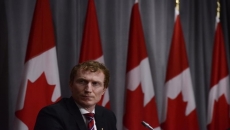Canada's economy had its worst quarterly showing since 2009 through the first three months of 2020, and may be headed to an even steeper drop, as steps taken to slow the spread of COVID-19 forced businesses to close and lay off workers.
Gross domestic product fell at an annualized rate of 8.2 per cent in the first quarter, including a 7.2-per-cent drop in March as restrictions by public health officials began rolling out during the month, including school closures, border shutdowns and travel restrictions.
Events earlier in the quarter also had a drag on GDP with Statistics Canada pointing to the Ontario teachers' strike and rail blockades in February, as well as a drop in oil prices.
The drastic drop in gross domestic product likely doesn't fully reflect the experience of every Canadian through this episode, said BMO chief economist Douglas Porter.
"You don't get the entire picture just from GDP and even from employment because policymakers have stepped up with such unusual and aggressive actions that a lot of the common metrics just don't apply 100 per cent in this episode," Porter said in an interview.
A preliminary estimate released by the Finance Department says the federal government posted a deficit of $21.8 billion for the fiscal year that closed in March. The figure will still be subject to revisions, which may land it closer to the government's last estimate of $26.6 billion, up from the $19.8 billion forecasted in last spring's budget.
The Finance Department's fiscal monitor says revenues hit $334.3 billion, a 1.8 per cent increase, compared to the previous fiscal year. Spending was up 4.7 per cent to over $331.4 billion, while public debt charges increased by 5.1 per cent to almost $25.9 billion.
The net federal debt pushed past $794.4 billion.
Additional spending rolled out in recent weeks is likely to push the debt even higher as the budget office has warned the deficit for this fiscal year could hit $260 billion as the government flows income supports to Canadian households.
Statistics Canada said household spending, a backbone of the Canadian economy, was down 2.3 per cent in the first quarter of 2020, the steepest quarterly drop ever recorded.
The drop in household spending was broad, affecting goods and services.
Statistics Canada said new car purchases were down 8.8 per cent, trucks and vans by 9.4 per cent and used cars by 10.1 per cent owing to "income uncertainty," more people working from home and the closure of dealerships in some provinces, including Ontario and Quebec.
Housing spending on clothing and footwear dropped as well by 16.4 per cent, as did spending on food, beverage and accommodation services — by 10.9 per cent — and air transport — by 15.7 per cent — as bars and restaurants were ordered closed and travel restrictions kicked in.
Instead, spending on going out became money spent staying in, Statistics Canada said.
Spending on food and non-alcoholic beverages increased by 7.2 per cent in the first quarter, while there was a six per cent rise in spending on alcoholic beverages.
As a result of less spending overall, the savings rate rose for the quarter to 6.1 per cent from the 3.6 per cent recorded in the fourth quarter of 2019 with higher rates recorded at higher income levels.
The savings some households have built up during the shutdown period could translate into extra spending as restrictions are eased and businesses reopen, says CIBC senior economist Royce Mendes.
"Overall, the economy has likely troughed at least for now, with businesses beginning to reopen," he wrote in a note. "Look for the economic data to begin showing signs of revival over the summer months, even if it only represents the low-hanging fruit of eased restrictions."
Similarly, TD senior economist Brian DePratto wrote in a note that it isn't unreasonable to think a modest recovery may already be forming.
"The key question is what kind of recovery? Given the significant hits to incomes and longer-lasting impacts on some industries, a marathon appears more likely than a sprint," he wrote.
The national statistics office said preliminary information indicates an 11 per cent drop in GDP for April, but that figure is likely to be revised as more information becomes available.
"Nonetheless, the March and April decreases are likely to be the largest consecutive monthly declines on record," the agency said in an online post this morning.
Similarly, the agency said first-quarter figures are likely to have larger than usual revisions in subsequent data releases as some numbers had to be estimated because they were not available on time.






